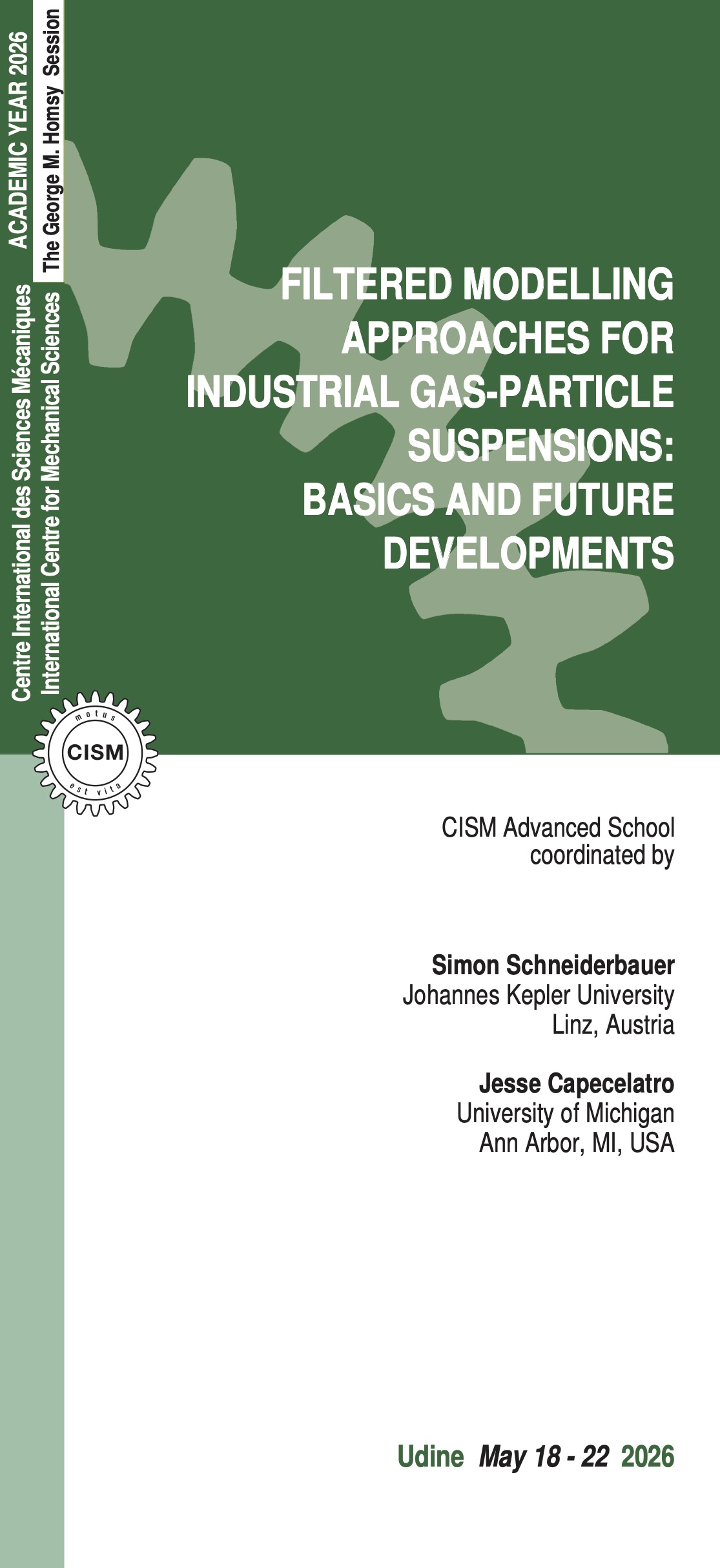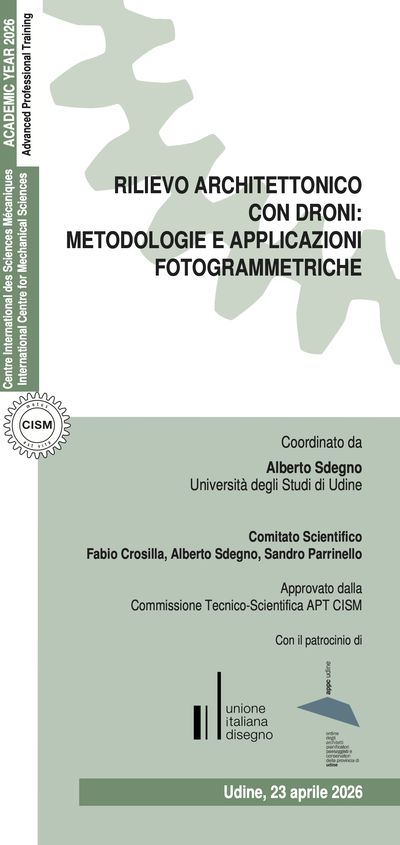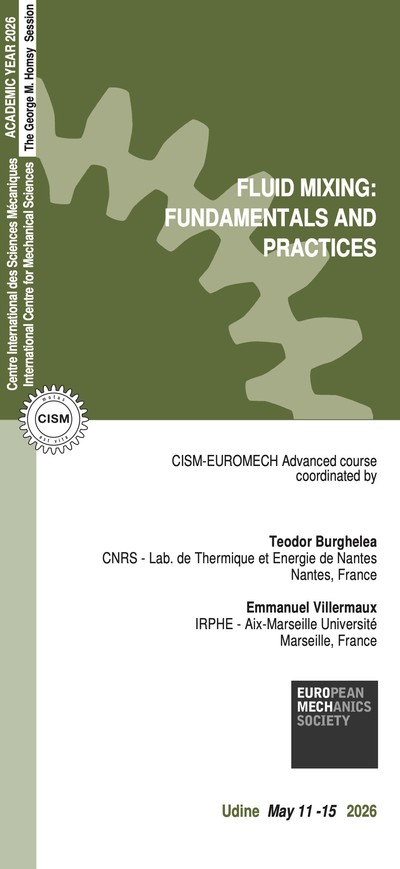This course focuses on numerical methods for simulating large-scale environmental and industrial gas-particle flows, such as fluidized beds used in biomass combustion, olefin polymerization, and oil cracking. Numerical simulations are vital for optimizing these processes to reduce CO2 emissions, energy consumption, and pollutant output. However, a major challenge lies in the wide range of scales involved: while large flow structures span meters, the smallest particle structures are only a few diameters wide. Simulating such systems requires solving trillions of particle trajectories and their interactions with the surrounding fluid, which is computationally infeasible even with state-of-the-art supercomputers.
To overcome this, continuum approaches are often employed, treating fluid and particle phases as interpenetrating continua. These methods, however, demand fine grid resolutions to capture heterogeneous structures like bubbles in fluidized beds or particle clusters in risers. As a result, their application is limited to a handful of high-performance computing (HPC) centers worldwide. Filtered (coarse-grained) models offer a solution by using coarser grids, but this can lead to inaccuracies, such as overestimating bed expansion in fluidized beds or misestimating bedload transport in deserts.
The course delves into the implications of coarse graining for numerical methods. For continuum models, the two-fluid model (TFM) is widely used in engineering applications. Coarse graining leads to the filtered two-fluid model (FTFM), which incorporates sub-grid effects. Without proper resolution, TFM predictions can be highly inaccurate, such as overestimating dense fluidized bed expansion or solid mass flow rates. FTFM addresses this by filtering TFM equations, introducing sub-grid terms that require closures. These closures are typically derived from analogies to single-phase turbulence or through machine learning/artificial intelligence (AI). FTFM has been successfully applied in industries like iron ore reduction and polyolefin production.
The course also examines Euler-Lagrangian methods, where the fluid phase is treated as a continuum and particles are tracked individually. These methods are computationally demanding, so parcel-based approaches are used, grouping particles into computational molecules (parcels) to reduce the number of equations. However, this introduces challenges similar to those in FTFM. A notable example is the MPPIC (multi-phase particle in cell) method.
Lecturers from leading research teams will provide an overview of state-of-the-art numerical methods for large-scale particulate flows, addressing challenges across different length scales. They will discuss current bottlenecks, innovative approaches (e.g., AI), and the advantages of coarse-graining models in practical applications. Additionally, the course will highlight how fluid and particle properties influence inter-particle and fluid-particle forces, ultimately shaping flow regimes.
This course especially addresses doctoral students, young researchers and practical engineers. Participants are encouraged to bring a poster covering their current research topic. Some of the lectures will also be accompanied by practical training examples.
Pope, S. B. (2000). Turbulent flows (Chapters 2, 3, 4 & 6). Cambridge University Press.
Subramaniam, S., & Balachandar, S. (2023). Modelling approaches and computational methods for particle-laden turbulent flows (Chapter 11). Elsevier Academic Press.
Schneiderbauer, S. (2024). Continuum modeling of gas–particle flows: An overview. Acta Mechanica, 235, 6959–7001.
Sundaresan, S., et al. (2018). Toward constitutive models for momentum, species, and energy transport in gas–particle flows. Annual Review of Chemical and Biomolecular Engineering, 9(4), 1–21.
Marchioli, C., et al. (2025). Particle-laden flows. International Journal of Multiphase Flow, 191, 105291.
Capecelatro, J., & Wagner, J. L. (2024). Gas–particle dynamics in high-speed flows. Annual Review of Fluid Mechanics, 56(1), 379–403.
Marchioli, C. (2017). Acta Mechanica, 228(3), 741–771.
Parmentier, J. F., et al. (2012). A functional subgrid drift velocity model for filtered drag prediction in dense fluidized beds. AIChE Journal, 58, 1084–1098.
Ozel, A., et al. (2013). Development of filtered Euler–Euler two-phase model for circulating fluidized bed: High-resolution simulation, formulation, and a priori analyses. International Journal of Multiphase Flow, 55, 43–63.
Hardy, et al. (2024). Theoretical derivation and a priori validation of a new scalar variance-based sub-grid drag force model for simulation of gas–solid fluidized beds. Powder Technology, 436, 119454.
5 lectures on:
Statistical and stochastic methods in multiphase flows, compressible multiphase flows, filtering of Euler-Lagrangian simulations, numerical implementation of Euler-Lagrange methods.
5 lectures on:
Introduction artificial intelligence (AI) methods; AI for large-scale gas-solid flow simulations; training process of neural networks; predictive capabilities of AI; how AI can be leveraged to enhance coarse-grained gas-solid flow simulations.
5 lectures on:
Coarse-grained models for Euler-Lagrangian methods including, drag force, stress, heat and mass transfer, wall effects, as well as radiation; applications of coarse-grained models to granular flows and high temperature applications.
5 lectures on:
Derivation of filtered models; overview of various closure models; these include functional, structural (deconvolution), and empirical models; filtered heat and mass transfer models for Euler-Euler methods; practical training.
5 lectures on:
History of filtered models and their connection to turbulence modeling; innovative approaches for closing the filtered drag force, e.g., solid-phase variance-based methods; limitations of high-performance computing; use of particle-resolved simulation data.
5 lectures on:
Models for multiphase flows, especially fluid-particle flow; physics of Euler-Lagrangian, Euler-Euler approaches and hybrid methods such as continuous particle models (CPM) or Multi-Phase Particle-In-Cell methods (MP-PIC).
ADMISSION AND ACCOMMODATION
The course is offered in a hybrid format, allowing participants the flexibility to attend either in person or remotely via the Microsoft Teams platform.
Admission to on-site attendance is granted on a first-come, first-served basis to comply with the capacity of the lecture room.
Registration fees:
- Early Bird On-Site Participation: € 650.00 + VAT* - Deadline: March 18, 2026
- Late On-Site Participation: € 800.00 + VAT* - Deadline: May 6, 2026
- Live Streaming Online Participation: € 250.00 + VAT* - Deadline: May 6, 2026
On-site participation includes a complimentary bag, five fixed menu buffet lunches, hot beverages, downloadable lecture notes.
Online participation includes downloadable lecture notes.
Application forms should be submitted online through the website: http://www.cism.it. A confirmation message will be sent to participants whose applications are accepted.
Upon request, and subject to availability, a limited number of on-site participants can be accommodated at the CISM Guest House for € 35 per person per night. To request accommodation, please contact foresteria@cism.it.
CANCELLATION POLICY
Applicants may cancel their registration and receive a full refund by notifying the CISM Secretariat in writing (via email) no later than:
- March 18, 2026, for early bird on-site participation;
- April 18, 2026, for late on-site participation;
- May 6, 2026, for online participation.
No refunds after the deadlines. Cancellation requests received before these deadlines and incorrect payments will be subject to a € 50.00 handling fee.
GRANTS
A limited number of participants from universities and research centers who do not receive support from their institutions can request a waiver of the registration fee and/or free lodging.
Requests should be submitted by email to the CISM Secretariat at info@cism.it by March 18, 2026. Submissions must include the applicant’s curriculum vitae and a letter of recommendation from the head of the department or a supervisor, confirming that the institute is unable to provide funding. Preference will be given to applicants from countries that sponsor CISM.





